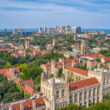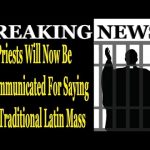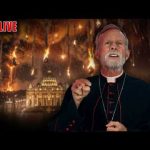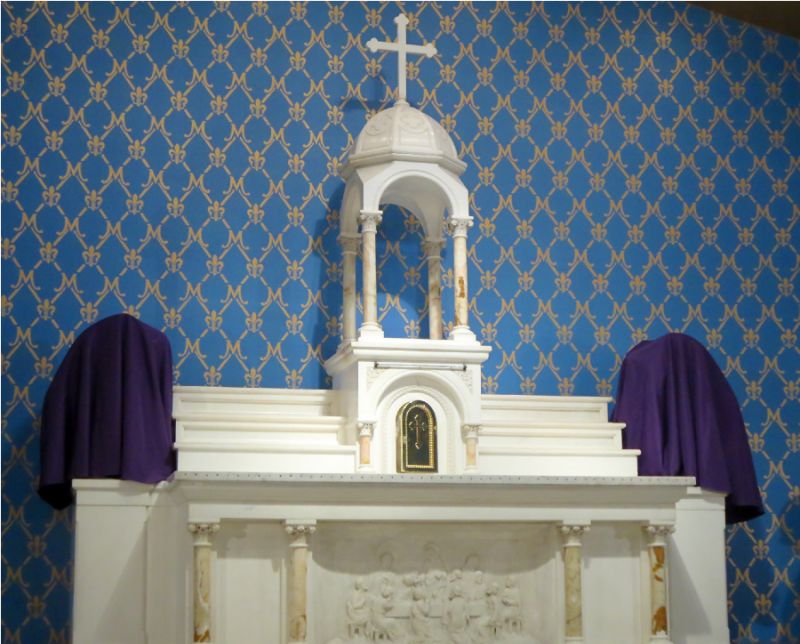A stripped altar on Holy Thursday 2015 at Mater Dei Parish in Irving, Texas. / Credit: Mater Dei Latin Mass parish via Flickr (CC BY-NC-ND 2.0)
Denver, Colo., Mar 28, 2024 / 04:00 am (CNA).
At the end of the season of Lent — and right before Easter — the Catholic Church observes the “sacred triduum.” Many Catholics have questions about what happens during the Triduum and how they should observe this time.
What is the triduum?
The triduum is a period that begins on Holy Thursday and ends at the conclusion of Easter Sunday.
It encompasses the evening of Holy Thursday, Good Friday, Holy Saturday, and Easter Sunday.
The term “triduum” means “three days” and refers to any three-day observance. Technically, the triduum during Holy Week is known as the “paschal triduum” or “Easter triduum.”
The word “paschal,” which is used to refer to Easter, comes from the Greek word “pascha,” which comes from the Hebrew word “pesach,” which means Passover. Jesus’ passion, death, and resurrection, which is connected theologically to the Passover feast, is referred to as the paschal mystery.
What happens on Holy Thursday?
On the evening of Holy Thursday, the Church celebrates the Mass of the Lord’s Supper, which commemorates Christ’s Passover meal with his apostles the night before he died. The Mass of the Lord’s Supper most especially remembers the institution of the Eucharist — the sacramental gift to the Church of Christ’s body and blood, given in the transformation of bread and wine.
Often, at the Mass of the Lord’s Supper, the priest washes the feet of some members of the congregation, recalling Christ’s washing of feet at the Last Supper. “If I, therefore, the master and teacher, have washed your feet, you ought to wash one another’s feet. I have given you a model to follow, so that as I have done for you, you should also do,” Christ told his apostles.
Why is it called ‘Maundy Thursday?’
Holy Thursday is sometimes called “Maundy Thursday.” The word “maundy” comes from the Latin word “mandatum,” which means mandate.
On Maundy Thursday, Christ gave us a mandate: “I give you a new commandment: love one another. As I have loved you, so you also should love one another.”
Is Holy Thursday a holy day of obligation?
No. And people may not be able to attend the Mass of the Lord’s Supper for a variety of reasons: their family needs, work schedule, or health. But it’s a beautiful Mass. You should go if you can!
Is there Mass on Good Friday?
No, there’s no Mass on Good Friday.
In fact, after Mass on Holy Thursday, the altar is stripped of its cloth. Crosses are removed from the Church or covered. No candles burn in the church.
The Blessed Sacrament is not reposed in the church’s tabernacle but in another small chapel.
On Good Friday, the church is empty of many of its symbols. It is adorned like a church in mourning. And, at 3 p.m., the Church offers the Celebration of the Lord’s Passion.
At this celebration, Scripture is read that recounts the prophetic anticipation of Christ’s passion and recounts the passion narrative itself. Communion is distributed. Believers are invited to venerate the cross — to come forward and kiss or reverence a cross.
“Behold the wood of the cross,” the priest proclaims.
I know that Good Friday is a solemn day, but what should we do all day?
Good Friday is a day of fasting and abstaining from meat. You can read more about that here.
On Good Friday, families should try to observe a quiet day of simplicity in addition to attending the Celebration of the Lord’s Passion.
This might mean praying the rosary together or reading Scripture together. It might mean keeping the TV off or going for a family hike. The idea is that it should be a day of reflection and should be noticeably different from other days of the year.
If you haven’t yet gone to confession during Lent, Good Friday is also an excellent day to go to confession — and take your family.
What does one do on Holy Saturday?
The culmination of Holy Saturday is the Easter Vigil. But it’s a long day, and people often ask what they should do with the rest of it.
Many families use Holy Saturday as a day for spring cleaning or garden planting. Some spend the day outdoors, and some spend the day preparing for an Easter feast. All the better if Holy Saturday is a day of prayer.
And some people dye Easter eggs!
And the Easter Vigil?
The Easter Vigil is one of the most beautiful liturgies in the Church’s calendar. It is spectacular and full of beautiful Catholic symbolism.
The vigil begins at night. It starts with a fire, which is blessed, and from which is lit the paschal candle. The whole of salvation history is proclaimed during the readings.
A beautiful Easter proclamation, called the Exsultet, is sung, usually by a deacon. (Done well, this is, in my humble opinion, one of the most beautiful things the Church does in a liturgy.) Men and women are welcomed into the Church: Some will be baptized and confirmed, and others, already baptized, will receive confirmation.
The Easter Vigil is awesome. Fair warning: It’s also long. And a lot of readings take place with the lights off. Some parents decide it is too much for children, while others bring their kids in pajamas and let them sleep in the pews. At the Easter Vigil, that’s perfectly understandable. A scan of your local parish church suggests that kids aren’t the only ones who sometimes fall asleep during the readings. It’s all part of the experience.
So, after that ends, is it Easter?
It sure is. If you go to the Easter Vigil, you may want to stay up and celebrate. The Lord’s resurrection is what Easter is all about. Some people will, of course, go to Easter Sunday Mass and then spend the day feasting with family and friends.
One piece of advice for celebrating Easter: Remember the poor, the lonely, the outcasts. If you really want to celebrate Easter, invite someone to your table who might have nowhere else to go. You’ll be glad you did.
And then Easter is over?
The triduum ends on the evening of Easter Sunday. But the “octave” of Easter lasts for eight days. And the liturgical season of Easter lasts for 50 days, all the way to Pentecost.
What does this mean? It means it’ll soon be time to celebrate Christ’s resurrection. Get ready for it!
This article was first published in April 2016 and has been updated.















